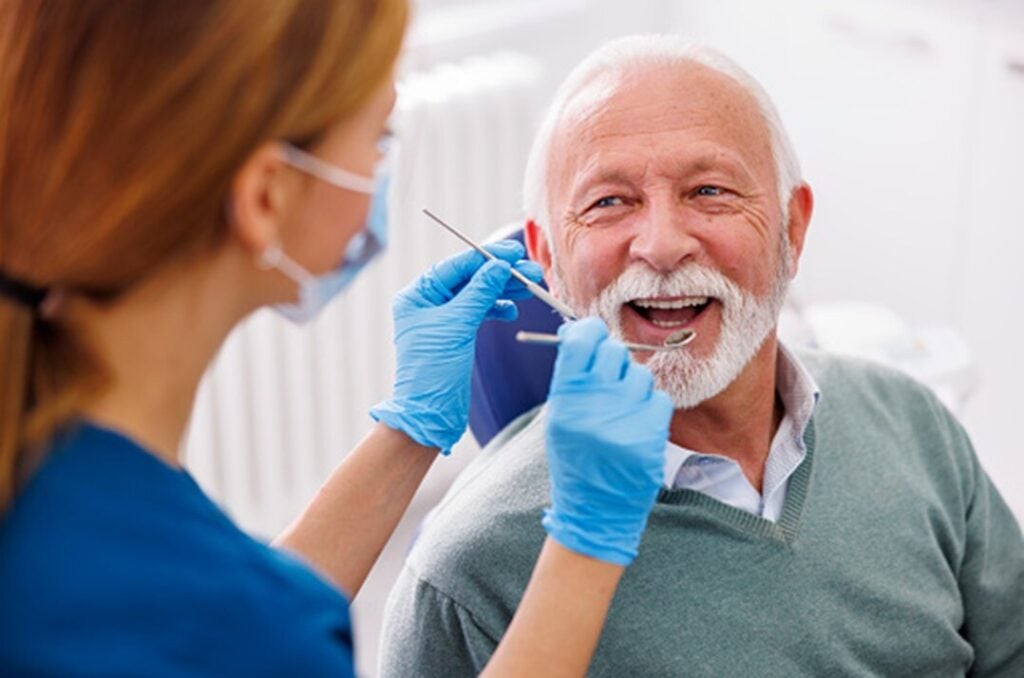-
Everything About Sleep Apnea
Everything You Need to Know About Sleep Apnea
Sleep apnea is a dangerous breathing disorder that causes you to repeatedly stop breathing during sleep. Without treatment, this condition can affect your personal life and relationships, energy levels, concentration and memory, work performance, and physical and mental health. If you are experiencing sleep apnea symptoms, it’s best to visit a professional for testing and a formal diagnosis. You can then explore your treatment options and make lifestyle changes that improve your sleep patterns and overall health. Here is your guide to everything you need to know about the different types of sleep apnea.

What Are the Different Types of Sleep Apnea?
Determining which type of sleep apnea you have will inform your treatment options and how you manage your condition. The three types are:
- Obstructive Sleep Apnea – This type of sleep apnea occurs when the muscles in your throat relax too much while you’re sleeping. This causes the surrounding tissues to impede on your windpipe, blocking air movement.
- Central Sleep Apnea – If you have central sleep apnea, your brain isn’t sending the proper signals to keep your breathing muscles operating while you sleep.
- Mixed or Complex Sleep Apnea – This is a combination of both obstructive and central sleep apnea.
What Are the Risk Factors & Causes of Sleep Apnea?
Sleep apnea is caused by either an obstruction of your windpipe while you sleep or a disruption of the communication between your brain and central nervous system, resulting in poor control of your breathing muscles while you sleep. Certain risk factors may make it more likely that you develop the condition, including:
- A family history of sleep apnea
- Large tonsils or adenoids
- Obesity
- Neurological conditions
- Certain medications
- Medical conditions that affect your throat or airway
What Are the Most Common Sleep Apnea Symptoms?
Symptoms of sleep apnea can affect every aspect of your life. The most common symptoms are:
- Disruption of Sleep – You may snore loudly, wake up repeatedly throughout the night, wake up choking or gasping for air, or experience changes in breathing patterns while you sleep, such as shallow breathing or fast breathing.
- Problems With or Changes in Your Physical Health – You may develop problems with your physical health, such as intense fatigue, frequent headaches, especially in the morning, restlessness, high blood pressure, heart problems or arrhythmias, weight gain, and night sweats.
- Mood Swings or Changes in Your Mental Health – You may also develop mood swings or rapid changes in mood or personality, as well as mental health problems like irritability, depression, or anxiety.
- Problems With Work or Relationships – You may develop problems that affect your ability to work or maintain a relationship, such as intense fatigue, falling asleep during the day, memory and concentration problems, mental health issues, mood swings, and sexual dysfunction.
Impact of Sleep Apnea on Health
Without treatment, sleep apnea can affect your physical and mental health and put a strain on your relationships. Untreated moderate sleep apnea or severe sleep apnea can increase your risk of certain heart conditions and health problems:
- Cardiovascular Health – You may have a greater risk of heart arrhythmias, heart damage, heart failure, heart attack, and stroke.
- Mental and Emotional Well-Being – You may develop anxiety, depression, and irritability and exhibit personality changes and mood swings. You may have problems at work or with your relationships. You may also suffer from restlessness, fatigue, weight gain, and sexual dysfunction.
- Long-Term Risks – You are at a greater risk of long-term health conditions like high blood pressure, cardiac problems, chronic stress, and obesity.
Sleep Apnea Treatment Options
Dr. Donahue and our team will determine which type of sleep apnea you have and its severity to develop a treatment plan. Your treatment options may include:
- Lifestyle Changes – We will recommend changes to your diet, regular exercise, weight loss, and changes to your sleep habits. We may suggest that you quit using tobacco products or drinking alcohol. We may also recommend changes in your sleep position, mattress and pillows, and sleep environment.
- CPAP Therapy (Continuous Positive Airway Pressure) – CPAP therapy uses pressurized air to keep your airways open while you sleep. It is a treatment option for obstructive sleep apnea.
- Dental Devices – A dental sleep apnea device is an oral appliance that can keep your airway open while you sleep.
- Surgery – You may need surgery on your nose, mouth, or throat to prevent airway blockages while you sleep. Jaw surgery can change the alignment and position of your jaw so that soft tissues won’t impede your airway. Nasal surgery can straighten the soft tissues in your nose so air can pass through more easily. Inspire therapy is an alternative to a CPAP, and it is a small implant for sleep apnea that is surgically implanted in the skin of your chest.
- Alternative Therapies – Alternative therapies for sleep apnea use functional medicine or regenerative medicine therapies to reduce or manage sleep apnea. These therapies may include chiropractic care, PRP therapy, acupuncture, massage therapy, myofunctional therapy, hypoglossal nerve stimulation, and positional therapy.
Call Donahue Dental to Explore Sleep Apnea Treatment Options
At Donahue Dental, Dr. Donahue and our team can run tests to determine if you have sleep apnea. We will design a personalized treatment plan based on the type and severity of your sleep apnea, age, overall health, symptoms, and lifestyle. Call us now or contact us online to schedule a consultation to explore your sleep apnea treatment options.
-
Dental Hygiene for Older Patients
At Donahue Dental, we understand the vital role dental hygiene plays in maintaining overall health, especially for older adults. Changes that come with age, such as reduced saliva production and a higher risk of gum disease, make it even more crucial to prioritize oral care. Regular brushing, flossing, and professional cleanings are essential to preventing issues like tooth decay, infections, and tooth loss, which can significantly impact your quality of life. Proper dental care also supports better nutrition by ensuring the ability to chew comfortably and effectively. At Donahue Dental, our mission is to help patients of all ages safeguard their oral health as part of a holistic approach to well-being. Below, we’ve provided essential information about dental hygiene for older patients.

Why Is Dental Hygiene Crucial for Older Adults?
Maintaining dental hygiene is particularly crucial for older adults because of the changes that come with aging and can significantly affect oral health. Reduced saliva production, a common issue in aging, often leads to dry mouth. This issue creates an environment where bacteria can thrive and increase the risk of tooth decay. Additionally, enamel naturally erodes over time, making teeth more vulnerable to sensitivity and damage. Older adults may also face an elevated risk of gum disease due to factors like weakened immune systems or underlying health conditions. Without proper care, these issues can escalate, potentially leading to tooth loss and impacting overall well-being. Prioritizing regular dental checkups and consistent oral hygiene routines helps mitigate these risks and maintain a higher quality of life.
Common Dental Issues Older Adults Experience
The risks of poor dental hygiene can increase significantly as people age. Donahue Dental urges older patients to stay active in dental hygiene programs and abide by information given by the American Dental Hygiene Association to avoid various dental issues, such as the following:
- Gum Disease – A bacterial infection often caused by plaque buildup, leading to inflammation, bleeding gums, and, if untreated, potential tooth loss.
- Tooth Decay and Cavities – The destruction of tooth enamel caused by acid-producing bacteria, forming holes or cavities that, if untreated, can cause pain and infection.
- Dry Mouth (Xerostomia) – A condition where insufficient saliva production leads to discomfort, difficulty chewing, and an increased risk of tooth decay.
- Tooth Loss – The result of severe decay, injury, or advanced gum disease, affecting chewing, speaking, and overall oral health.
- Oral Cancer – A serious condition often detected as sores or lumps in the mouth, requiring early intervention for effective treatment.
Tips for Good Oral Hygiene Maintenance as You Age
Staying on top of your oral health in the advancing years is crucial for your overall health and happiness. If you’re unsure where to start, Donahue Dental has explained several oral hygiene tips below to put you on the right track:
- Brushing Techniques – Use a soft-bristled toothbrush and fluoride toothpaste to gently clean your teeth twice daily, ensuring you reach all surfaces for thorough plaque removal.
- Flossing and Interdental Care – Clean between teeth daily using floss or an interdental cleaner to remove debris and plaque in hard-to-reach areas.
- Using Mouthwash – Rinse with an antimicrobial or fluoride mouthwash to reduce bacteria, freshen your breath, and strengthen tooth enamel.
- Managing Dry Mouth – Stay hydrated, chew sugar-free gum, or use saliva substitutes to keep your mouth moist and reduce discomfort.
- Regular Dental Checkups – Visit your dentist every six months for professional cleanings and to address potential issues early.
Special Considerations for Older Adults With Dentures
Proper denture cleaning is essential to maintaining oral health and extending the life of your dentures. Begin by rinsing your dentures with water to remove loose food particles. Use a soft-bristled brush and a gentle, non-abrasive denture cleanser to clean all surfaces thoroughly, avoiding regular toothpaste because it can cause scratches. Always remove your dentures overnight and soak them in a specialized denture solution to keep them moist and hygienic. Additionally, clean your gums, tongue, and any remaining teeth daily to prevent plaque buildup and irritation. Schedule regular dental visits to ensure a proper fit and assess the condition of your dentures.
How Caregivers Can Help With Oral Health in Older Adults
Caregivers play a crucial role in supporting older adults with their oral hygiene routines, especially those with mobility or cognitive challenges. They assist by ensuring older adults complete daily practices thoroughly and consistently, such as brushing, flossing, and denture care. By monitoring the oral health of older adults, caregivers can spot early signs of issues like gum disease or infections and encourage timely visits to dental professionals. Offering reminders, assistance with products like denture adhesives or cleansers, and maintaining a compassionate approach promotes oral health and the dignity and well-being of those in their care.
Get in Touch With Donahue Dental for Dental Care & Insight
Now that you know more about dental hygiene for older patients, Donahue Dental recommends putting this information to work for your health and happiness every day. Our dental practice will gladly help you stay current on essential oral care, including cleanings, fillings, and vital insight you can apply to your daily routine. Get in touch with us today to speak with our team and schedule dental care.
